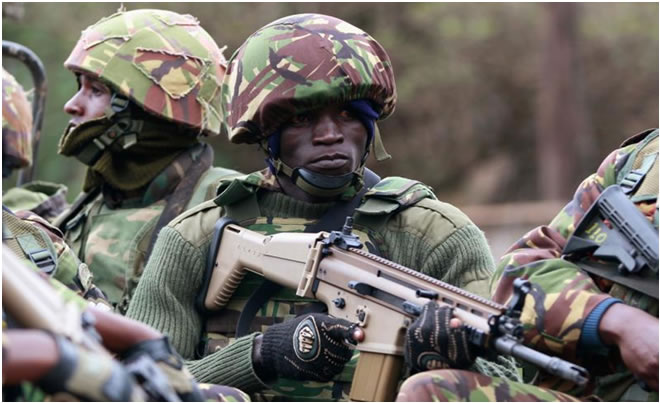
By Heikal I. Kenneded
Thursday, April 23, 2015
Most peace-loving Somalis acknowledge the recent attacks of Al-Shabab terrorists inside Kenyan are un-Islamic, inhumane and most importantly do not advance the Somali cause. However, the recent news that “Kenya vows not to withdraw from Somalia” promptedmost of Somalis’ mind to wonder the roots of Kenya’s resolve to keep its troops inside Somalia, despite suffering devastating back-to-back terror attacks from allegedly Al-Shabab terrorists. For some time now, especially after the last decade Kenya has been quite keen to interfere in Somali politics that eventually led the unilateral invasion of its troops in Somali in 2011, at the pretext of rooting out the Al-Shabab terrorists. Now, that Kenya faces an existential threat due to its economy’s dependence on Western tourism and investment, both of which have been badly damaged by the vicious and unpredictable attacks of alleged Al-Shabab terrorists.
Not withstanding, Kenya is bent on getting bogged down in Somalia, which has signaled a deep distrust among most Somalis to wonder, what exactly does Kenya want from Somalia, including its unofficial annexation of the Somali port town of Kismayo, which sanctions Kenya to capitalize on the port’s revenues, not to mention violating the UN embargo on the sale of charcoal. However, the most damaging allegation against Kenya’s malicious involvement in Somalia is its illegal annexation of Somalia’s maritime territorial waters, which Kenya believesto hold tremendous amounts of oil deposits and fishery that they’ve already licensed Western oil companies to begin their explorations. This is currently disputed at the International Court of Justice (ICJ) in the Netherlands and Kenya is fathomably apprehensive that it might lose a huge potential economic zone in the Indian Ocean. But the important question that Kenya needs to answer is: whether in the long run its illegitimate gains from Somalia outweigh the sacrifices of its security and entire economy?
What Kenya needs to understand
History shows that no matter how divided and unpatriotic Somalis seemto look from outside, they have always become unified in the event of their country being invaded by foreign forces.Kenya should thus be advised that it will never achieve its own ill-intended interests in Somalia; no matter how hard they try to buy Somali politicians, or how much political pressure they put on them. While it would be a bit naïve to think that Kenya is solely involved in the Somali quagmire for its alleged financial gains, besides being used as a proxy war puppet that only advances the economic and strategic interests of foreign allies. The invasion of Kenya in Somalia was neither sanctioned by its parliament as required by the Kenyan constitution nor by the African Union or the United Nations Security Counciland thus it was ill-fated from the get go. But Kenya has still time to rethink the far reaching negative consequences of its long term strategy and goals in Somalia due to the high potential for getting bogged down in Somalia, which might lead to its imminent implosion.Further, no amount of pressure should allow Kenya to blindly deprive and destabilize Somalia, including its deeply flawed threats to illegally deporting half-a-million of Somali refugees in Dadaab, or building a security wall along its entire border with Somalia.
In fact, one thing is clear that Kenya apparently hasn’t learned any lessons from the misguided offensive of Ethiopians to occupy Somalia back in 2006, which ended in catastrophic defeat of the Ethiopians. Ironically, the original insurgency that eventually gave rise to Al-Shabab stemmed from the Ethiopian’s invasion in Somalia. Not withstanding, it seems Kenya has embraced the precarious strategy of illegally occupying Somalia under the pretext of fighting against terrorists while capriciously using predator drone attacks inside Somalia territories and therefore provoking many non-militant civilians and may create more people to join Al-Shabab forces. In fact, most Somalis now believe that Kenya’s reckless drone strikes in southern Somalia is totally counter productive and only tends to motivate Al-Shabab militants to use as a recruitment tool, as well as conduct terrorist attacks that target against innocent Kenyan civilians, not to mention their main target - Somalis.
Likewise, it would be naïve to expect too much from elite Somali-Kenyansdue to their conflicted-allegiance to the Kenyan Republic becausetheirlaw-makers in the Kenyan parliament have become the epitome of flip-flopping on their stand against Kenya’s naked proxy war inside Somalia by one day standing with their Somali brethren in Kenya and then going against them whenever the going-gets-tough. Instead, they should try to convince other Kenyan MPs that Kenya alone cannot successfully defeat Al-Shabab and they need the full-partnership of the Somali government. Despite Somalia’s fledgling government and continuously being at the brunt of Al-Shabab terrorist attacks, still nobody knows better than them how to root out these terrorists from their hiding holes around the country and its border with Kenya.Thus, the Kenyan government would be better advised to seek the Somali Federal government’s close collaboration, instead of sending unhelpful emissaries to illegally annexed states inside Somalia proper.
In the end, no matter what Kenya wants from Somalia, the two countries’ relationship should be forged with honest dialogue, free fromillegal land or marine annexations and using the wrong political leverages. The way forward may have to be found through a mix of middle-of-the-road approaches, accommodating reasonable expectations with respect to Somalia’s right of its sovereignty, aside from anylong-pending or contentious bilateral issues. If this does not happen, security mechanisms and the deeply flawed counter-terrorism grid in Kenya would have to be rather perfected further because Al-Shabab’s excuse to exploit soft-target security threats against civilians would unfortunately continue.
Heikal I. Kenneded
Washington D.C
[email protected]